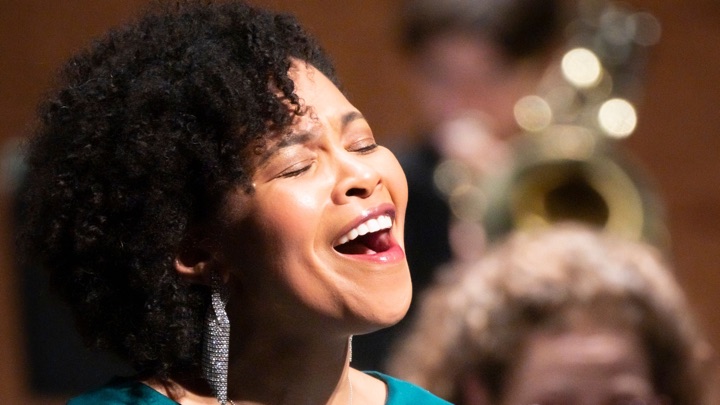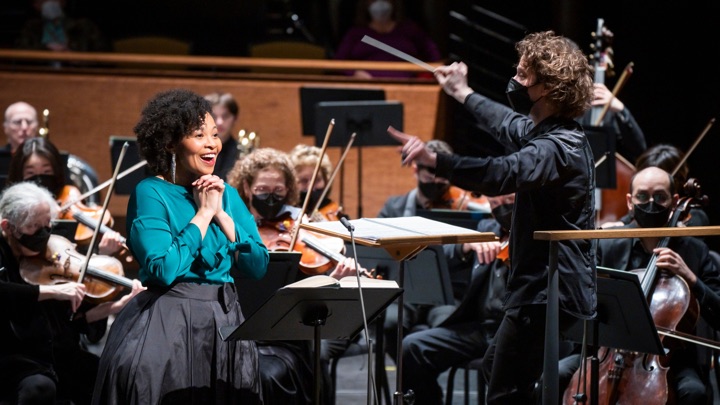

As David Geffen Hall is under noisy gut renovation (for the third or fourth time?), the temporarily homeless orchestra has been wandering between Carnegie Hall, Alice Tully Hall and, in this case, the Rose Theater at Jazz at Lincoln Center in the Time-Warner Center. The relative intimacy of the last suited Schultz whose gleaming soprano easily filled the auditorium thanks in no small part to Rouvali’s delicately supportive accompaniment with the Philharmonic in resplendent form.
Written in 1918 for Elisabeth Schumann (who did not, however, premiere them), the songs are better known as the Brentano-Lieder after Clemens Brentano, the writer from whose works the texts were drawn. Originally composed for voice and piano, Strauss began to orchestrate them in 1933, completing the task seven years later.
Like Schumann, Schultz sings Pamina in Die Zauberflöte, but the punishingly high tessitura and dizzying coloratura demands of the fifth and best-known song “Amor” have meant that several of the sopranos who have embraced the Brentano have also excelled as the Queen of the Night. The one CD version that I own is Edda Moser’s steely traversal with piano accompaniment, but Rita Shane, Edita Gruberová and Diana Damrau have recorded all six of the songs with orchestra while Natalie Dessay limited herself to just three.
Scanning the archives of Carnegie Hall and the New York Philharmonic I couldn’t find any previous instance before this weekend when all six of the Brentano were performed together. The closest was a 1991 recital by Kathleen Battle at Carnegie when she tackled the first five, omitting “Lied der Frauen,” an intensely dramatic work which James Keller in his notes for the Philharmonic rightly compared to an outtake from Die Frau ohne Schatten. It’s then not surprising that one singer who performed “Lied der Frauen” locally was Deborah Voigt.
Though it doesn’t fit well with the previous five, Schultz made “Lied der Frauen” work for her by not pushing her slighter voice and by infusing the concluding iterations of “Gelobt” with moving intensity. Her natural charm shone strongest in the second and third songs, “Ich wollt ein Sträusslein binden” and, especially, the adorable “Säus’le, liebe Myrte!” Her vivacious manner, thousand-watt smile and crisp diction instantly drew in her listeners.
Though it coped well with the fanciful elaborate curlicues of “Amor” Schultz’s golden soprano with its quick vibrato does not “live” high above the staff suggesting that Ariadne auf Naxos’s Zerbinetta will not likely to be part of her Strauss repertoire. After I got home from the concert, I wanted to hear Schultz sing the Brentano again and imagined a perfect Strauss CD that would combine them with the final scene of Daphne!
Unfortunately, the Philharmonic did no favors its enthusiastic sold-out audience as Schultz performing these rarely heard songs: the program contained no texts or translations and the projected titles were so dim that I couldn’t read them, even from my fifth- row orchestra seat.
For those who missed these very rare complete Brentano songs with orchestra, the local Strauss-fest continues next week with a Met revival of Ariadne starring Lise Davidsen, Brenda Rae and Isabel Leonard, followed in April by Elektra again with Davidsen and Nina Stemme. Rumor has it that Davidsen also returns next season to Lincoln Center for her first Rosenkavalier Marschallin.
Photos: Chris Lee


























Comments